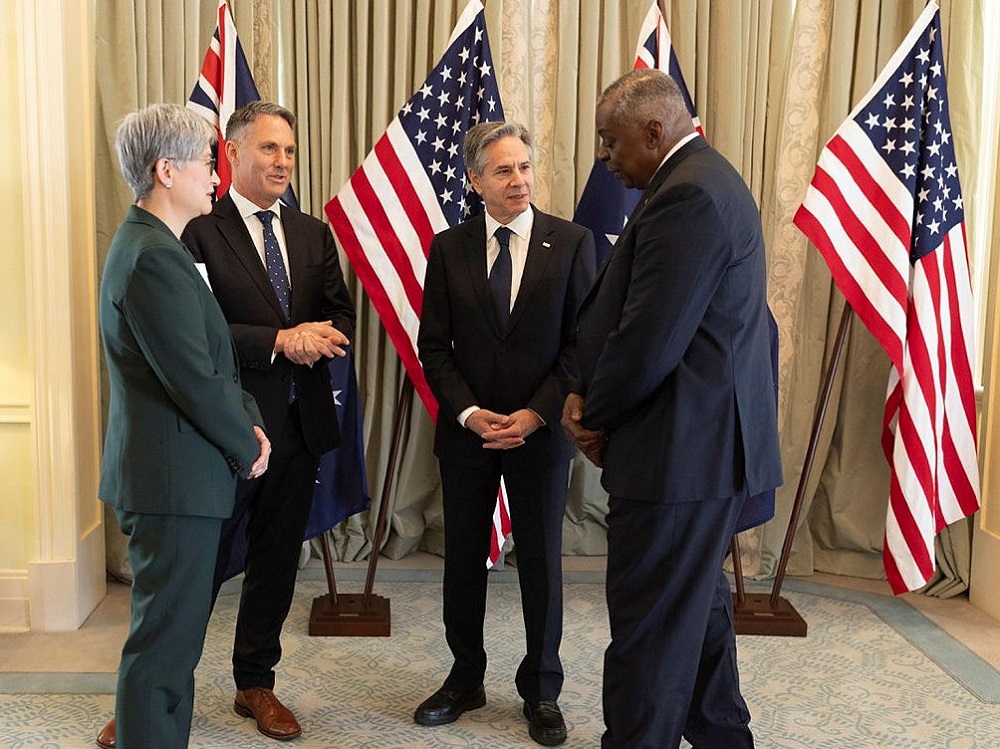
The lead-up to Saturday’s meeting between Australia’s defence and foreign affairs ministers and their US counterparts was low key, as were the expectations. But optics and substance are not always perfectly matched with AUSMIN meetings, and of course it’s never entirely clear what goes on behind closed doors.
On a close read, there’s an underlying theme in the four principals’ joint communiqué to which the Australian public should be alive, and that is one of preparedness. It is a difficult conversation, clearly, and one that is easier to avoid in the short term. But the agreements in the communiqué focus squarely on the theme—even if the term itself isn’t used—that we need to be prepared should strategic competition escalate to crisis or conflict.
As part of this theme of preparedness, the importance of the US–Australia force posture initiatives were re-enforced. Signed in 2014, the five initiatives under the force posture agreement all received a mention, with new areas of coordination highlighted. A sixth element was added under space coordination.
The communiqué highlighted an intent to ‘operationalise the alliance’, a theme that threaded through the majority of the defence cooperation areas announced. But operationalise to what end? Clearly, the aim is to be prepared for what might occur in our region.
A key element of the focus on ‘operationalising the alliance’ was the agreement to rotate US Navy maritime patrol and reconnaissance aircraft through Australia to enhance regional maritime domain awareness. The US aircraft in question will be the P-8 Poseidon, a capable intelligence, surveillance and reconnaissance and anti-submarine-warfare platform of which Australia operates 12.
While US P-8s already operate in the region from Okinawa and Guam, this move not only provides depth in operations in Southeast Asia and the Western Pacific, but also allows for increased interoperability, or arguably interchangeability, with the Royal Australian Air Force fleet. Under the enhanced air cooperation program, there were also mentions of the already agreed upgrades of RAAF bases Darwin and Tindal. And there were commitments to scope additional upgrades to two bare bases—RAAF Base Scherger in Queensland, approximately 470 kilometres south of Cape York, and RAAF Base Curtin in Western Australia, approximately 200 kilometres from Broome.
This agreement is consistent with the messaging of the Australian government in both the 2020 force structure plan and the recent defence strategic review. Given that the government almost certainly had work planned for these bases, the mention in the AUSMIN communiqué is telling in itself. There is always a decision at AUSMIN on what parts of the discussions to include in the public-facing document and what to keep behind closed doors. In some ways, every aspect of the communiqué should be considered through this lens. The continued focus on joint US–Australian efforts to upgrade bare bases is sending a public message that in a crisis or conflict US assets will operate from dispersed bases in northern Australia to mitigate the risk that Chinese military capabilities pose to US bases on Okinawa and Guam. And on the theme of preparedness, an underlying message is that, while not inevitable, the likelihood of a crisis or conflict is not remote.
The theme of operationalising the alliance was also evident in the discussion of both the land and logistics elements of the force posture initiatives. The intent to rotate US Army watercraft through Australia appears new, and is timely given the defence strategic review’s focus on accelerating Australian Army littoral capability. The rationale behind this decision isn’t entirely evident; however, there are obvious benefits in mitigating the capability gap until the Australian Army acquires or upgrades its capabilities in this space. On the land domain front, there was also agreement to conduct a ‘proof of principle’ prepositioning of US Army stores in Bandiana, Victoria.
The defence-related themes also explored areas of collaboration on integrated air and missile defence, guided weapons and explosive ordnance, and intelligence. The relationship with Japan warranted a strong mention that indicated a desire to increase trilateral cooperation on exercises and training-related activities, including activities directly related to the RAAF F-35 joint strike fighter.
There was a lot in the joint communiqué for defence and foreign policy pundits to be intrigued by. But the document isn’t just important to those with a specific interest in defence and foreign policy. It contains an important message for all Australians that deserves attention. The likelihood of a crisis or conflict in our region is not remote, and our preparedness to confront this fact deserves attention.

